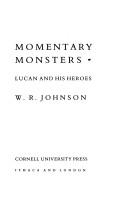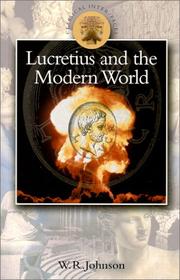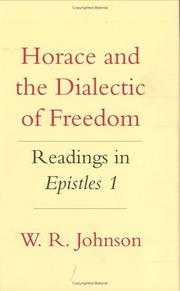| Listing 1 - 10 of 25 | << page >> |
Sort by
|
Book
ISBN: 0520044622 Year: 1982 Publisher: Berkeley University of California press
Abstract | Keywords | Export | Availability | Bookmark
 Loading...
Loading...Choose an application
- Reference Manager
- EndNote
- RefWorks (Direct export to RefWorks)
Poetry --- 82-14 --- Classical poetry --- -Lyric poetry --- -Poetry --- Classical literature --- Lyriek. Minnezang. Religieuze poëzie. Lied --- History and criticism --- Lyric poetry --- History and criticism. --- -Lyriek. Minnezang. Religieuze poëzie. Lied --- 82-14 Lyriek. Minnezang. Religieuze poëzie. Lied --- -82-14 Lyriek. Minnezang. Religieuze poëzie. Lied

ISBN: 080142030X Year: 1987 Volume: vol 47 Publisher: Ithaca (N.Y.): Cornell university press
Abstract | Keywords | Export | Availability | Bookmark
 Loading...
Loading...Choose an application
- Reference Manager
- EndNote
- RefWorks (Direct export to RefWorks)
871 LUCANUS, MARCUS ANNAEUS --- Epic poetry, Latin --- -Heroes in literature --- Latin epic poetry --- Latin poetry --- Latijnse literatuur--LUCANUS, MARCUS ANNAEUS --- History and criticism --- Caesar, Julius --- -Cato, Marcus Porcius --- -Lucan --- Pompey the Great --- -Caesar, C. Iuluis --- Caesar, C. Julius --- Caesar, Caius Julius --- Caesar, Cajus Julius --- Caesar, G. J. --- Caesar, Gaius Iulius --- Caesar, Gaius Julius --- Cäsar, Julius --- Cèsar, G. Juli --- Cèsar, Gai Juli --- Cesar, Gayo Julio --- César, Jules --- César, Julio, --- Cesare, C. Iulio --- Cesare, C. Julio --- Cesare, Caio Giulio --- Cesare, Gaio Giulio --- Cesare, Giulio --- Cezar, Juliusz --- Gaius Julius Caesar --- I︠U︡liĭ T︠S︡ezarʹ --- Julius Caesar --- Julius Caesar, Gaius --- Juliusz Cezar --- Kʻai-sa --- Kaisa --- T︠S︡ezarʹ, I︠U︡liĭ --- צעזר, יוליוס --- קיסר, יוליוס --- יוליוס, קיסר --- In literature --- Rome --- History --- -Literature and the war. --- Heroes in literature. --- History and criticism. --- Lucan, --- Cato, Marcus Porcius, --- Pompey, --- In literature. --- Literature and the war. --- -In literature --- 871 LUCANUS, MARCUS ANNAEUS Latijnse literatuur--LUCANUS, MARCUS ANNAEUS --- Rim --- Roman Empire --- Roman Republic (510-30 B.C.) --- Romi (Empire) --- Heroes in literature --- Pypłacz, Joanna. --- Cato, M. Porcius --- Cato, --- Cato Uticensis, Marcus Porcius, --- Catone, --- Uticensis, Marcus Porcius Cato, --- Caesar, C. Iuluis --- Pompeius Magnus, Cn. --- Pompeo, --- Pompeyo, --- Lucan --- César --- Cesare --- Caesar, Caius Iulius --- Lucain (marcus annaeus lucanus), poete latin, 39-65 --- Litterature latine --- Critique et interpretation
Book
ISBN: 0520029429 Year: 1976 Publisher: Berkeley University of California press
Abstract | Keywords | Export | Availability | Bookmark
 Loading...
Loading...Choose an application
- Reference Manager
- EndNote
- RefWorks (Direct export to RefWorks)
Virgil. --- Aeneas (Legendary character) in literature --- Epic poetry, Latin --- -Rome in literature --- Latin epic poetry --- Latin poetry --- History and criticism --- Virgil --- Virgilio Marone, P. --- Vergilius Maro, Publius --- Vergilīĭ --- Virgile --- Vergílio --- Wergiliusz --- Vergilīĭ Maron, P. --- Vergilīĭ Maron, Publīĭ --- Verhiliĭ Maron, P. --- Vergil --- Virgilio --- Virgilīĭ --- Virgilius Maro, P. --- Virgilius Maro, Publius --- Virgil Maro, P. --- ווירגיל --- וירגיליוס --- ורגיליוס --- מרו, פובליוס ורגיליוס --- فرجيل --- Pseudo-Virgil --- Pseudo Virgilio --- Virgilio Marón, Publio --- Bhārjila --- Aeneas (Legendary character) in literature. --- History and criticism. --- Rome --- In literature. --- Virgilio Marone, P., --- Vergilīĭ, --- Virgile, --- Vergílio, --- Wergiliusz, --- Vergilīĭ Maron, Publīĭ, --- Verhiliĭ Maron, P., --- Vergil, --- Virgilio, --- Virgilīĭ, --- Virgilius Maro, P., --- Virgilius Maro, Publius, --- Virgil Maro, P., --- ווירגיל, --- וירגיליוס, --- ורגיליוס, --- מרו, פובליוס ורגיליוס, --- فرجيل, --- Pseudo-Virgil, --- Pseudo Virgilio, --- Virgilio Marón, Publio, --- Bhārjila,

ISBN: 0715628828 9780715628829 1336211679 1472502272 1472502280 1472539907 Year: 2006 Publisher: London Bloomsbury Academic, an imprint of Bloomsbury Pub. Plc
Abstract | Keywords | Export | Availability | Bookmark
 Loading...
Loading...Choose an application
- Reference Manager
- EndNote
- RefWorks (Direct export to RefWorks)
"Lucretius' On the Nature of Things - one of the glories of Latin literature - provides a vivid poetic exposition of the doctrines of the Greek atomist, Epicurus. The poem played a crucial role in the reinvention of science in the seventeenth century, its influence on the French Enlightenment was powerful and pervasive, and it became a major battlefield in the wars of religion with science in nineteenth-century England. But in the twentieth century, despite its vital contributions to modern thought and civilisation, it has been largely neglected by common readers and scientists alike. This book offers an extensive description of the poem, with special emphasis on its cheerful version of materialism and on its attempt to devise an ethical system that suits such a universe. It surveys major relevant texts form the eighteenth and nineteenth centuries (Dryden, Diderot, Voltaire, Tennyson, Santayana) and speculates on why Lucretius and the ancient scientific tradition he championed has become marginalised in the twentieth century. It closes with a discussion of what value the poem has for students of science and technology in the new century: what advice it has to offer us about how to go about reinventing our machines and our morality."--Bloomsbury Publishing Lucretius' On the Nature of Things - one of the glories of Latin literature - provides a vivid poetic exposition of the doctrines of the Greek atomist, Epicurus. The poem played a crucial role in the reinvention of science in the seventeenth century, its influence on the French Enlightenment was powerful and pervasive, and it became a major battlefield in the wars of religion with science in nineteenth-century England. But in the twentieth century, despite its vital contributions to modern thought and civilisation, it has been largely neglected by common readers and scientists alike. This book offers an extensive description of the poem, with special emphasis on its cheerful version of materialism and on its attempt to devise an ethical system that suits such a universe. It surveys major relevant texts form the eighteenth and nineteenth centuries (Dryden, Diderot, Voltaire, Tennyson, Santayana) and speculates on why Lucretius and the ancient scientific tradition he championed has become marginalised in the twentieth century. It closes with a discussion of what value the poem has for students of science and technology in the new century: what advice it has to offer us about how to go about reinventing our machines and our morality
Atomism. --- Influence (Literary, artistic, etc.) --- Lucretius Carus, Titus.

ISBN: 0801428688 Year: 1993 Publisher: Ithaca (N.Y.): Cornell university press
Abstract | Keywords | Export | Availability | Bookmark
 Loading...
Loading...Choose an application
- Reference Manager
- EndNote
- RefWorks (Direct export to RefWorks)
Epistolary poetry, Latin --- -Political poetry, Latin --- -Liberty in literature --- Rome in literature --- Dialectic --- Polarity --- Polarity (Philosophy) --- Freedom in literature --- Liberty as a theme in literature --- Latin political poetry --- Latin poetry --- Latin epistolary poetry --- History and criticism --- Horace --- -Gorat︠s︡īĭ --- Gorat︠s︡iĭ Flakk, Kvint --- Horacij --- Horacio, --- Horacio Flaco, Q. --- Horacjusz --- Horacjusz Flakkus, Kwintus --- Horacy --- Horatius Flaccus, Quintus --- Horaṭiyos --- Horaṭiyus --- Horats --- Horaz --- Khorat︠s︡iĭ --- Khorat︠s︡iĭ Flak, Kvint --- Orazio --- Orazio Flacco, Quinto --- הוראציוס --- הורטיוס --- Views on liberty --- Dialectic. --- Liberty in literature. --- Political poetry, Latin --- Rome in literature. --- History and criticism. --- Horace. --- -Horace --- Horacij Flakk, Kvint --- -Views on liberty --- Liberty in literature --- Rome --- In literature.

ISBN: 1472539907 1472502272 9781472502278 9780715628829 9781472539908 0715628828 9780715628829 9781472502285 1472502280 Year: 2006 Publisher: London
Abstract | Keywords | Export | Availability | Bookmark
 Loading...
Loading...Choose an application
- Reference Manager
- EndNote
- RefWorks (Direct export to RefWorks)
"Lucretius' On the Nature of Things - one of the glories of Latin literature - provides a vivid poetic exposition of the doctrines of the Greek atomist, Epicurus. The poem played a crucial role in the reinvention of science in the seventeenth century, its influence on the French Enlightenment was powerful and pervasive, and it became a major battlefield in the wars of religion with science in nineteenth-century England. But in the twentieth century, despite its vital contributions to modern thought and civilisation, it has been largely neglected by common readers and scientists alike. This book offers an extensive description of the poem, with special emphasis on its cheerful version of materialism and on its attempt to devise an ethical system that suits such a universe. It surveys major relevant texts form the eighteenth and nineteenth centuries (Dryden, Diderot, Voltaire, Tennyson, Santayana) and speculates on why Lucretius and the ancient scientific tradition he championed has become marginalised in the twentieth century. It closes with a discussion of what value the poem has for students of science and technology in the new century: what advice it has to offer us about how to go about reinventing our machines and our morality."--Bloomsbury Publishing Lucretius' On the Nature of Things - one of the glories of Latin literature - provides a vivid poetic exposition of the doctrines of the Greek atomist, Epicurus. The poem played a crucial role in the reinvention of science in the seventeenth century, its influence on the French Enlightenment was powerful and pervasive, and it became a major battlefield in the wars of religion with science in nineteenth-century England. But in the twentieth century, despite its vital contributions to modern thought and civilisation, it has been largely neglected by common readers and scientists alike. This book offers an extensive description of the poem, with special emphasis on its cheerful version of materialism and on its attempt to devise an ethical system that suits such a universe. It surveys major relevant texts form the eighteenth and nineteenth centuries (Dryden, Diderot, Voltaire, Tennyson, Santayana) and speculates on why Lucretius and the ancient scientific tradition he championed has become marginalised in the twentieth century. It closes with a discussion of what value the poem has for students of science and technology in the new century: what advice it has to offer us about how to go about reinventing our machines and our morality
Atomism. --- Atomic theory --- Philosophy --- Philosophy, Ancient --- Pluralism --- Lucretius Carus, Titus. --- Lucretius Carus, Titus --- Lukrecjusz Karus, Tytus --- Lukret︠s︡iĭ Kar, Tit --- Lucrezio, Tito --- Lucrèce --- Lucrez --- Lukrez --- Lucrecio Caro, T. --- Caro, T. Lucrecio --- Carus, Titus Lucretius --- Lucretius --- Lucrezio Caro, Tito --- Lucrecio --- Lucreti Cari, T. --- Lucreci --- לוקרציוס קרוס, טיטוס --- Influence. --- Influence (Literary, artistic, etc.) --- Artistic impact --- Artistic influence --- Impact (Literary, artistic, etc.) --- Literary impact --- Literary influence --- Literary tradition --- Tradition (Literature) --- Art --- Influence (Psychology) --- Literature --- Intermediality --- Intertextuality --- Originality in literature
Book
ISBN: 022625237X 9780226252377 9780226252230 022625223X 1336190175 Year: 2015 Publisher: Chicago London
Abstract | Keywords | Export | Availability | Bookmark
 Loading...
Loading...Choose an application
- Reference Manager
- EndNote
- RefWorks (Direct export to RefWorks)
One of the best books ever written on one of humanity's greatest epics, W. R. Johnson's classic study of Vergil's Aeneid challenges centuries of received wisdom. Johnson rejects the political and historical reading of the epic as a record of the glorious prehistory of Rome and instead foregrounds Vergil's enigmatic style and questioning of the heroic myths. With an approach to the text that is both grounded in scholarship and intensely personal, and in a style both rhetorically elegant and passionate, Johnson offers readings of specific passages that are nuanced and suggestive as he focuses on the "somber and nourishing fictions" in Vergil's poem. A timeless work of scholarship, Darkness Visible will enthrall classicists as well as students and scholars of the history of criticism-specifically the way in which politics influence modern readings of the classics-and of poetry and literature.
Epic poetry, Latin --- History and criticism. --- Virgil. --- Aeneas --- Αἰνείας --- Aineias --- Enéas --- Эней --- Ėneĭ --- Еней --- Eneja --- Enees --- Eneo --- Énée --- Aeinéas --- Enea --- Enejs --- Enėjas --- Aineiasz --- アイネイアース --- Aineiāsu --- Eneasz --- Ajnejas --- Eneias --- Енеја --- Aeneis --- 埃涅阿斯 --- Ainieasi --- In literature. --- Rome --- aeneid, vergil, virgil, rome, mythology, history, literature, prehistory, heroism, aeneas, aeneis, epic poetry, allegory, apollonius, homer, classicism, language, prosody, narrative, distancing, interiority, tragedy, empire, literary criticism, nonfiction, nachleben, fall, decline, dissolution, politics, hero, sacrifice, war, destruction, violence, gods, classics, ancient world, greece.
Book
ISBN: 0801466938 Year: 1993 Publisher: [Place of publication not identified] Cornell University Press
Abstract | Keywords | Export | Availability | Bookmark
 Loading...
Loading...Choose an application
- Reference Manager
- EndNote
- RefWorks (Direct export to RefWorks)
Informal in tone and seemingly effortless in movement, Horace's Epistles have haunted and delighted readers for two millennia. W. R. Johnson offers an extraordinarily suggestive new interpretation of Book 1 of the Epistles, an interpretation not only of the poems but of the poet they reveal.Johnson regards the Epistles as the fruit of the poet's search for freedom, clarity of perception, and inner harmony in a complex society. He portrays Horace as a paradoxical combination of sophist and gardener, working both nature and culture within a terrain bounded on the one side by chaos and on the other by technocracy. Resisting any linear, progressive reading, he traces the key themes in the poems, such as Horace's relationships with his father and with Rome, his adoptive city, and the conflicts between urban vitality and rustic serenity and between inner freedom and outer freedom. While in the end Johnson maintains that the Epistles uphold the possibility that the individual can achieve a dynamic balance of heart and soul, he demonstrates that what nourishes the poems are the suffering and fear, resentment and anger that underlie their carefully controlled surface. Horace and the Dialectic of Freedom will engage and challenge classicists, students of Latin literature, and others interested in satire and in the history of poetry.
Epistolary poetry, Latin --- Political poetry, Latin --- Liberty in literature --- Dialectic --- History and criticism --- Horace. --- Rome --- In literature.
Book
ISBN: 0801466873 Year: 2019 Publisher: Ithaca, NY : Cornell University Press,
Abstract | Keywords | Export | Availability | Bookmark
 Loading...
Loading...Choose an application
- Reference Manager
- EndNote
- RefWorks (Direct export to RefWorks)
This book is a lively and provocative reading of the Roman poet Lucan (A.D. 39-65) which casts new light on the Pharsalia, his epic poem and only surviving work. The distinguished classicist W. R. Johnson demonstrates both the need to understand Lucan's epic on its own terms and the injustice of dismissing it as an inferior version of the Aeneid.Johnson looks closely at Lucan's treatment of the central figures of the epic, focusing on Lucan's sardonic style and fascination with horror. He concentrates on four larger-than-life figures-Erichtho, Cato, Pompey, and Caesar-whom he regards as central to Lucan's vision of the fall of the Republic; through them, he addresses the poem's themes and techniques. Placing special emphasis on the black farce characteristic of the poem, Johnson also deals with the grotesque aspects (for example, the snakes and the witch) that other critics have tended to ignore or to underplay as mere rhetoric.
Epic poetry, Latin --- Heroes in literature --- History and criticism --- Lucan, --- Cato, Marcus Porcius, --- Pompey, --- Caesar, Julius --- In literature. --- In literature. --- In literature. --- Rome --- History --- Literature and the war.
Book
Year: 1936 Publisher: Lincoln (Neb.) Nebraska Geological Survey
Abstract | Keywords | Export | Availability | Bookmark
 Loading...
Loading...Choose an application
- Reference Manager
- EndNote
- RefWorks (Direct export to RefWorks)
| Listing 1 - 10 of 25 | << page >> |
Sort by
|

 Search
Search Feedback
Feedback About UniCat
About UniCat  Help
Help News
News